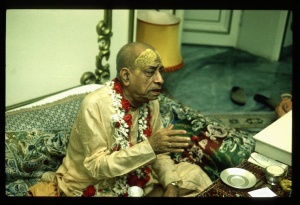SB 9.14.15-16: Difference between revisions
(Vanibot #0018 edit: make synonym terms in Sanskrit italic in SB - Vanisource) |
(Vanibot #0054 edit - transform synonyms into clickable links, which search similar occurrences) |
||
| Line 28: | Line 28: | ||
<div class="synonyms"> | <div class="synonyms"> | ||
''tataḥ'' | ''[//vanipedia.org/wiki/Special:VaniSearch?s=tataḥ&tab=syno_o&ds=1 tataḥ]'' — from him (Budha); ''[//vanipedia.org/wiki/Special:VaniSearch?s=purūravāḥ&tab=syno_o&ds=1 purūravāḥ]'' — the son named Purūravā; ''[//vanipedia.org/wiki/Special:VaniSearch?s=jajñe&tab=syno_o&ds=1 jajñe]'' — was born; ''[//vanipedia.org/wiki/Special:VaniSearch?s=ilāyām&tab=syno_o&ds=1 ilāyām]'' — in the womb of Ilā; ''[//vanipedia.org/wiki/Special:VaniSearch?s=yaḥ&tab=syno_o&ds=1 yaḥ]'' — one who; ''[//vanipedia.org/wiki/Special:VaniSearch?s=udāhṛtaḥ&tab=syno_o&ds=1 udāhṛtaḥ]'' — has already been described (in the beginning of the Ninth Canto); ''[//vanipedia.org/wiki/Special:VaniSearch?s=tasya&tab=syno_o&ds=1 tasya]'' — his (Purūravā's); ''[//vanipedia.org/wiki/Special:VaniSearch?s=rūpa&tab=syno_o&ds=1 rūpa]'' — beauty; ''[//vanipedia.org/wiki/Special:VaniSearch?s=guṇa&tab=syno_o&ds=1 guṇa]'' — qualities; ''[//vanipedia.org/wiki/Special:VaniSearch?s=audārya&tab=syno_o&ds=1 audārya]'' — magnanimity; ''[//vanipedia.org/wiki/Special:VaniSearch?s=śīla&tab=syno_o&ds=1 śīla]'' — behavior; ''[//vanipedia.org/wiki/Special:VaniSearch?s=draviṇa&tab=syno_o&ds=1 draviṇa]'' — wealth; ''[//vanipedia.org/wiki/Special:VaniSearch?s=vikramān&tab=syno_o&ds=1 vikramān]'' — power; ''[//vanipedia.org/wiki/Special:VaniSearch?s=śrutvā&tab=syno_o&ds=1 śrutvā]'' — by hearing; ''[//vanipedia.org/wiki/Special:VaniSearch?s=urvaśī&tab=syno_o&ds=1 urvaśī]'' — the celestial woman named Urvaśī; ''[//vanipedia.org/wiki/Special:VaniSearch?s=indra&tab=syno_o&ds=1 indra]-[//vanipedia.org/wiki/Special:VaniSearch?s=bhavane&tab=syno_o&ds=1 bhavane]'' — in the court of King Indra; ''[//vanipedia.org/wiki/Special:VaniSearch?s=gīyamānān&tab=syno_o&ds=1 gīyamānān]'' — when they were being described; ''[//vanipedia.org/wiki/Special:VaniSearch?s=sura&tab=syno_o&ds=1 sura]-[//vanipedia.org/wiki/Special:VaniSearch?s=ṛṣiṇā&tab=syno_o&ds=1 ṛṣiṇā]'' — by Nārada; ''[//vanipedia.org/wiki/Special:VaniSearch?s=tat&tab=syno_o&ds=1 tat]-[//vanipedia.org/wiki/Special:VaniSearch?s=antikam&tab=syno_o&ds=1 antikam]'' — near him; ''[//vanipedia.org/wiki/Special:VaniSearch?s=upeyāya&tab=syno_o&ds=1 upeyāya]'' — approached; ''[//vanipedia.org/wiki/Special:VaniSearch?s=devī&tab=syno_o&ds=1 devī]'' — Urvaśī; ''[//vanipedia.org/wiki/Special:VaniSearch?s=smara&tab=syno_o&ds=1 smara]-[//vanipedia.org/wiki/Special:VaniSearch?s=śara&tab=syno_o&ds=1 śara]'' — by the arrows of Cupid; ''[//vanipedia.org/wiki/Special:VaniSearch?s=arditā&tab=syno_o&ds=1 arditā]'' — being stricken. | ||
</div> | </div> | ||
Latest revision as of 23:43, 18 February 2024

A.C. Bhaktivedanta Swami Prabhupada
TEXTS 15-16
- tataḥ purūravā jajñe
- ilāyāṁ ya udāhṛtaḥ
- tasya rūpa-guṇaudārya-
- śīla-draviṇa-vikramān
- śrutvorvaśīndra-bhavane
- gīyamānān surarṣiṇā
- tad-antikam upeyāya
- devī smara-śarārditā
SYNONYMS
tataḥ — from him (Budha); purūravāḥ — the son named Purūravā; jajñe — was born; ilāyām — in the womb of Ilā; yaḥ — one who; udāhṛtaḥ — has already been described (in the beginning of the Ninth Canto); tasya — his (Purūravā's); rūpa — beauty; guṇa — qualities; audārya — magnanimity; śīla — behavior; draviṇa — wealth; vikramān — power; śrutvā — by hearing; urvaśī — the celestial woman named Urvaśī; indra-bhavane — in the court of King Indra; gīyamānān — when they were being described; sura-ṛṣiṇā — by Nārada; tat-antikam — near him; upeyāya — approached; devī — Urvaśī; smara-śara — by the arrows of Cupid; arditā — being stricken.
TRANSLATION
Thereafter, from Budha, through the womb of Ilā, a son was born named Purūravā, who was described in the beginning of the Ninth Canto. When his beauty, personal qualities, magnanimity, behavior, wealth and power were described by Nārada in the court of Lord Indra, the celestial woman Urvaśī was attracted to him. Pierced by the arrow of Cupid, she thus approached him.